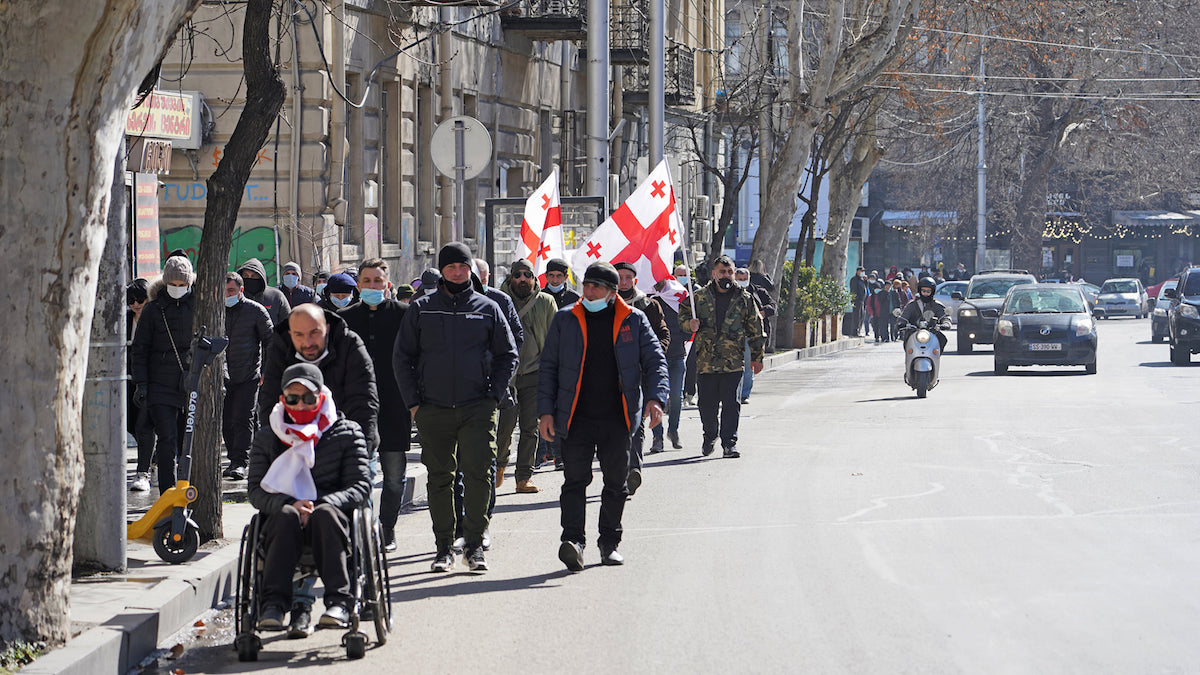Why the political crisis in Georgia can't be solved
The political crisis in Georgia continues.
The proposal offered by the European Union which the ruling party agreed to adapt after some hesitation, did not convince the opposition bloc and did not succeed in addressing the main issues that Georgian democracy is currently faced with.
The main obstacle hampering the effective resolution of the ongoing crisis is that each of the sides has its own definition of compromise.
For Western mediators, the compromise would involve the opposition taking up its seats in parliament and having the government authorities begin working on large-scale electoral and judicial reforms.
In turn, the opposition bloc demands the immediate release of political prisoners and an agreement to hold early elections or a plebiscite first. It is not yet clear how the ruling party envisions a compromise with the opposition, as it has already rejected the two main demands of the latter.
Nevertheless, even now when the ruling party has agreed to adopt the proposal offered by Western mediators, the main problem remains unresolved – that of the informal rule of the oligarch Bidzina Ivanishvili.
Below, a JAMnews analysis: what kind of a compromise can help Georgia overcome political enmity and end the ongoing crisis?
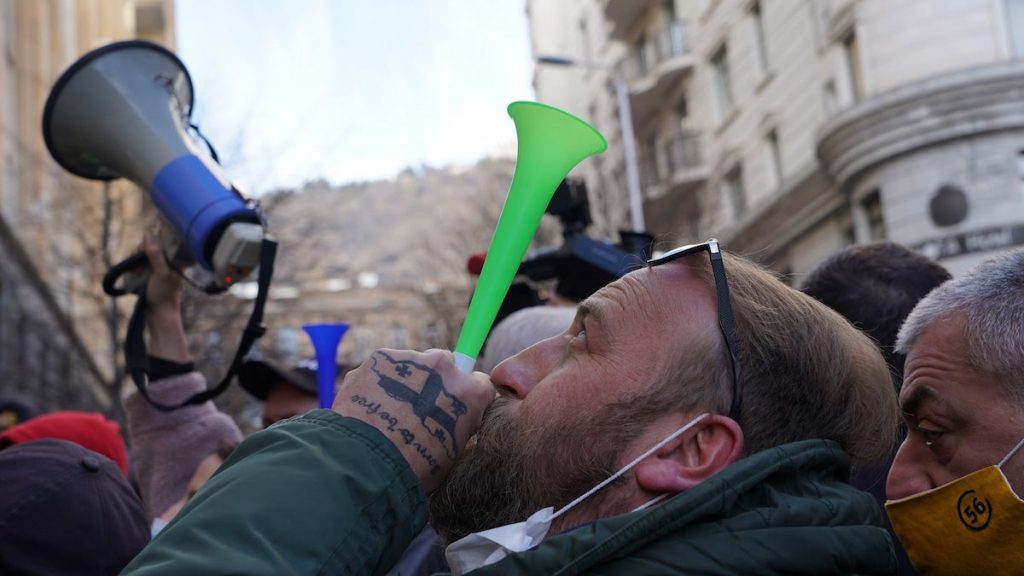
The ongoing political crisis in Georgia began shortly after the results of the October 2020 parliamentary elections had been announced, and, to this day, the ruling party and the opposition bloc, which does not recognize the results of the elections and boycotts its seats in the parliament, cannot come to an agreement despite the mediation and intervention of high-ranking Western diplomats. What is the reason for the protracted political crisis and what can potentially resolve it?
The opposition’s decision to boycott its mandates in the parliament was not supported by Western diplomats and politicians, the traditional supporters of Georgia’s democratic transition.
Several rounds of negotiations mediated by high-ranking European diplomats have not led to a meaningful result – the opposition continues to boycott its mandates, the crisis led to the resignation of Prime Minister Gakharia, and the transition of several MPs from the ruling party into opposition bloc. However, despite all this, the ruling party does not acknowledge the ongoing crisis and is not eager to make any changes to resolve it.
- European Parliament ‘disappointed’, proposes suspending financial aid to Georgia
- ‘Georgia may lose everything if it does not overcome the political crisis’ – hearings in the US Senate
Or so it was until today. On April 16, the chairman of the Georgian parliament, Archil Talakvadze, announced that the ruling Georgian Dream party would sign a draft agreement proposed at the end of March by the EU representative Christian Danielson.
With this proposal, the opposition is invited to enter parliament and take on some important roles there, while the ruling party is expected to support the proposed changes in the staffing of election commissions, the appointment of judges and the prosecutor general.
In addition, the Georgian Dream stated that it is ready to discuss the possibility of early elections if it receives less than 40% of the votes in the upcoming local and regional elections this fall.
However, the majority of opposition forces immediately reacted to Talakvadze’s statement with a categorical refusal – they are not going to sign the agreement if it does not take into account the two main demands of the opposition – early elections and the release of political prisoners.
Controversial elections and limited international monitoring
The main point of disagreement between the ruling party and the opposition bloc is the assessment of the October 2020 election results. As per the official results, the Georgian Dream received 48.22% of the votes under the proportional system. Besides, it won in all 30 majoritarian constituencies thereby securing a majority in parliament.
In turn, as per the announced results, 8 opposition parties were able to enter the Georgian parliament by passing a threshold of 1%. The main opposition party, the United National Movement, led by former President Mikheil Saakashvili, won 27% of the vote, while the remaining parties scored the total amount of votes ranging between 1% -3.8% each. The majority of the opposition parties, including both pro-Western ones and the pro-Russian Alliance of Patriots and Democratic Movement parties, claimed that the elections were rigged elections and refused to take on their seats in parliament.
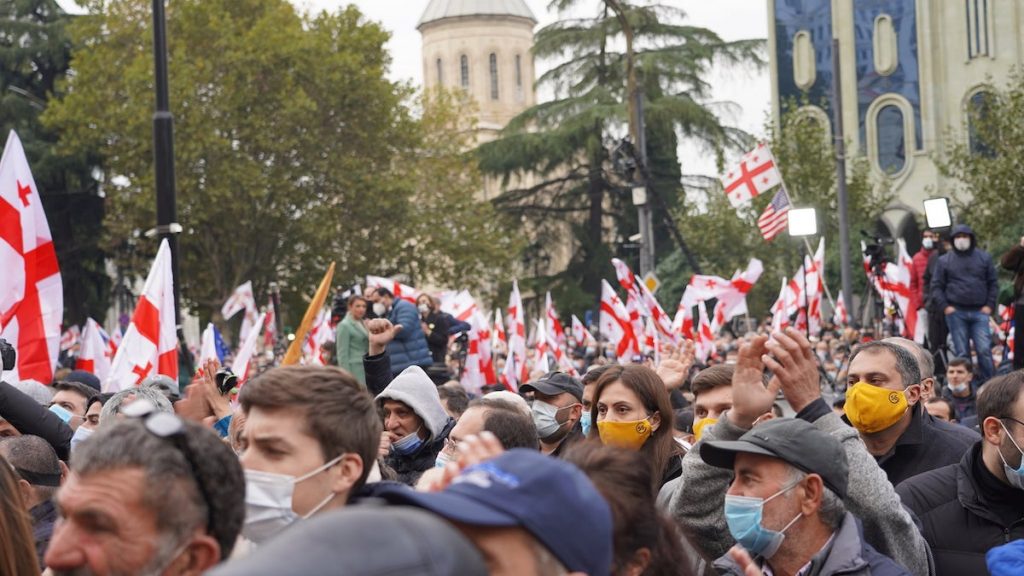
The opposition’s arguments boil down to the fact that the official election results do not reflect the will of the voters in Georgia, as well as the fact that during the election process, both during the election campaign and during the counting of votes gross violations have been detected.
But what proof does the opposition have? Both the opposition and the international observers noted that much like in all previous elections, government authorities used their administrative resources to the utmost. The observers revealed the incidents of influencing the employees of the budgetary organizations, as well as incidents of voter intimidation.
Moreover, both the opposition and independent observers noted that what made the October 2020 parliamentary elections different is the fact that this time, violations that took place during the vote-counting have also been revealed.
Observers and opposition representatives note that a significant vote imbalance was determined in hundreds of polling stations, meaning that there was a discrepancy between the voter turnout and the number of ballots in the ballot boxes. In some cases, there were fewer ballots than the actual voters, which suggests that the so-called carousels were massively used or that some of the ballots were simply hidden or thrown away.
In other polling stations, on the contrary, many more ballots were found than voters arrived. And this means the so-called “stuffing”.
In addition, compared to the previous years, the number of rejected ballots has increased significantly.
A large number of protocols from polling stations that were released on the Central Election Commission’s website the night after the elections contained errors such as a significant excess of the number of votes cast over the registered number of voters. Members of the election commission later filled in special protocols for correction, sometimes more than once.
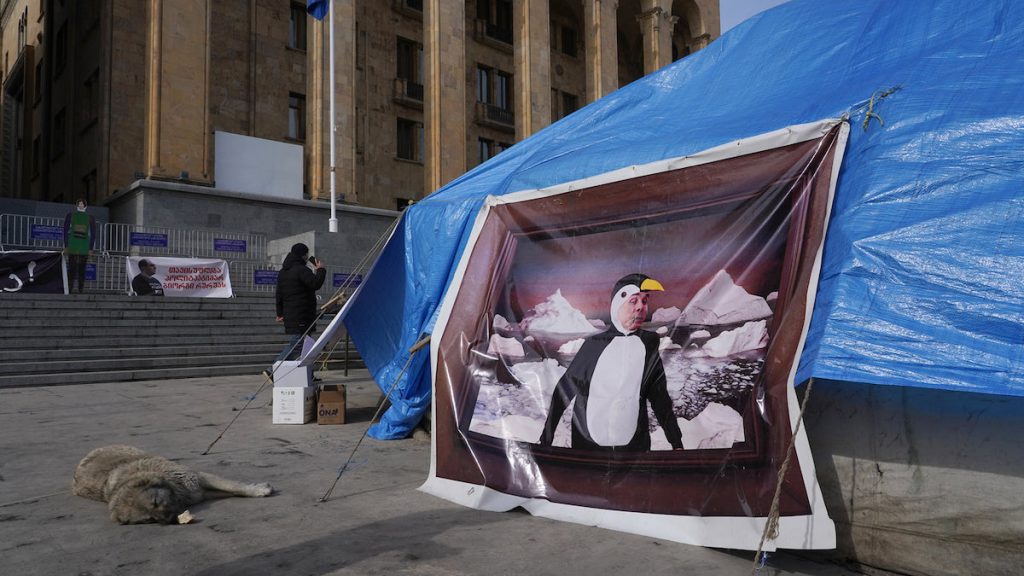
In addition, the election commissions, under some far-fetched pretexts, did not accept from the opposition almost a single complaint of the violations that had been recorded, and appeals to the court also had no effect. Individuals who were involved in drafting the complaints later stated that there were so many violations that it was physically impossible to file a full-fledged claim for each case.
As a result of the elections, the ruling party received a little less than 2% more votes than the opposition parties which now united into a single bloc and together demand early elections to be held.
The government authorities, in turn, cite the assessments of the OSCE / ODIHR mission, which, as a result of the outbreak of the global pandemic ended up being the only foreign observing mission present during the October 2020 parliamentary elections in Georgia. The first statement of the OSCE mission, which was released the morning after the elections, the October 2020 parliamentary elections “were competitive and held in general respect for the fundamental freedoms. However, widespread accusations of pressure on voters and blurring of the boundaries between the ruling party and the state undermined public confidence in some aspects of the electoral process”.
In March, the mission’s final report was released, reiterating the first statement and providing lengthy recommendations for improving the electoral process in the future.
On the basis of OSCE statements, MEPs and EU leaders say that the elections in Georgia were generally fair and free. This, in particular, was stated by the High Representative of the European Union for Foreign Affairs Josep Borrell during a meeting with the prime minister of Georgia in Brussels.
Crisis and negotiations
In the beginning, the majority of the opposition parties unanimously called for repeat elections to be held. Subsequently, one of the opposition parties – the Citizens alliance which received just over 1% of votes during the elections, agreed to take the two parliamentary seats that it had won. In addition, five MPs from the Alliance of Patriots party also entered parliament, contrary to the decision of the party leadership, and formed the European Socialists faction there.
The opposition organized several protests in the capital, in which up to 10-15 thousand people took part. However, this did not seem to impress the government authorities. The Georgian Dream claimed that it had legitimately won a majority in parliament and was not going to fulfill the demands of the opposition.
The opinion of Georgia’s Western partners also played against the Georgian opposition. Representatives of the US State Department, the European Union, and MEPs called on the Georgian opposition to abandon the boycott, since, in their opinion, all political disagreements should only be resolved in the form of parliamentary debates.
The stalemate lasted until the crisis hit a new peak after the arrest of Nika Melia, chairman of the main opposition party United National Movement. Melia is involved in the case of the riots that took place in Tbilisi on June 20, 2019, when a crowd outraged by the presence of Russian MP Gavrilov in the Georgian parliament had several clashes with the police.
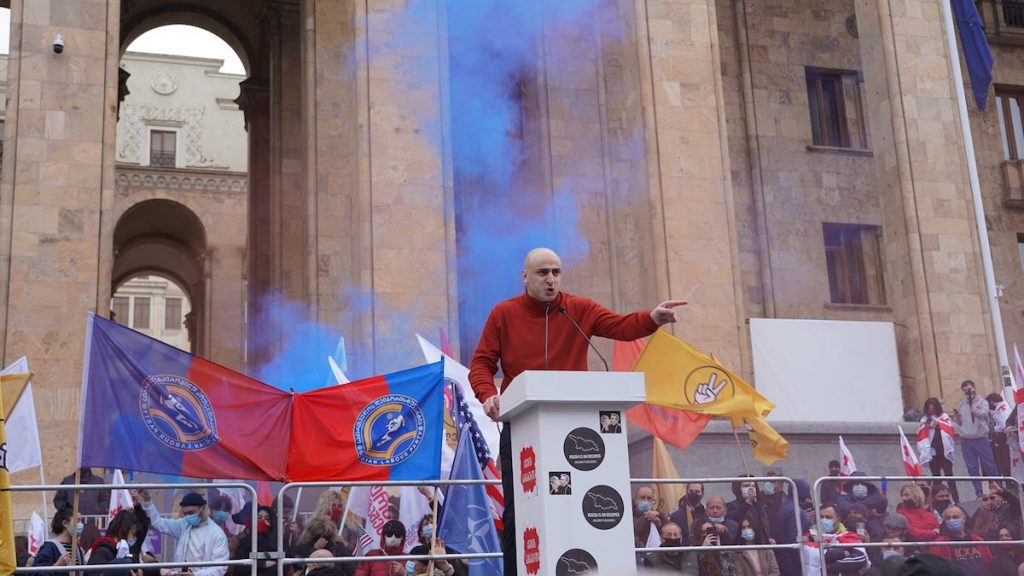
Nika Melia who was held under house arrest publically took off an electronic tracking bracelet during one of the post-election protests. After the incident, the court ruled that Melia should pay bail, which he, in turn, defiantly refused to pay.
On February 17, the court ruled in favor of Melia’s arrest. By that time, Melia had barricaded himself in his party headquarters, surrounded by his supporters. The next day after the court ruling, unexpectedly for everyone, the Prime Minister of Georgia Giorgi Gakharia announced his resignation and stated that his decision was motivated by the fact that he disagreed with the court’s ruling in favor of Melia’s arrest.
Gakharia was replaced by the former prime minister who occupied this office between 2013-2015, Irakli Garibashvili, one of the most loyal allies of the informal leader of the ruling party and the de facto ruler of Georgia, oligarch Bidzina Ivanishvili.
As a result, Melia was arrested on February 23, during the special ops’ storming of the United National Movement’s headquarters who entered the building from the roof via the fire escape. Melia’s arrest caused a wave of disapproval among Georgia’s Western partners, who considered the arrest to be politically motivated and demanded Melia’s immediate release.
After some time, representatives of the ruling party said that Melia could be released as soon as he paid the bail. However, Melia still refuses to pay it as he considers his arrest and the court’s ruling in favor of him having to pay the bail to be illegal.
At the insistence and mediation of the US and EU embassies, negotiations began between the government and the opposition. Jean Michel, President of the European Council, was actively involved in the attempts to resolve the crisis.
On March 1, President Michel made a personal visit to Tbilisi and tried to reconcile the government authorities with the opposition bloc by having them sit down at the negotiating table, however, nothing came of it. Having presented his proposals to the parties, he returned to Brussels, but the parties failed to come to an agreement.
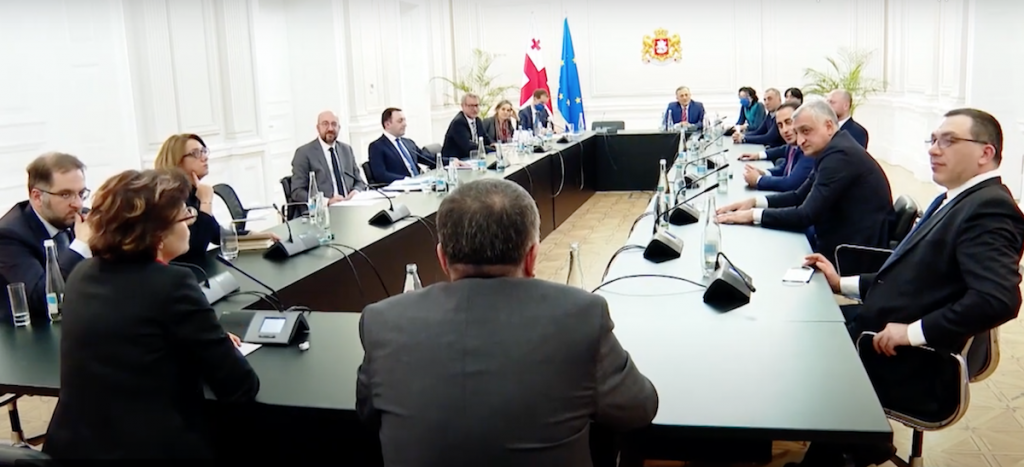
Shortly after, President Michel sent his representative Christian Danielson to Tbilisi on a special mission to continue negotiations. However, this mission was unsuccessful as well, and on March 31, following two rounds of tense negotiations with representatives of the parties, Danielson was forced to publicly state that none of the parties agreed with his proposals, and the draft agreement that Danielsson proposed was released to the public.
However, it took the ruling party more than two weeks to decide whether it is ready to sign the document.
Why was it not possible to reach an agreement despite the pressure of the West on both sides?
The representatives of the ruling party constantly stressed that they did not see any crisis in Georgia. Georgian Dream believes that it has legitimately won a solid parliamentary majority. Moreover, up to this point, the “dreamers” were free to rule as they pleased. The ruling party only agreed to join the negotiations with the opposition after the persistent calls from its Western allies.
Any statement by Western politicians, which can be regarded as criticism of the opposition, only strengthens the Georgian Dream in its unshakable position and gives the authorities another reason to increase pressure on its political opponents, often by using force.
One might assume that the Georgian Dream is less interested in the success of the negotiations as opposed to making opposition appear guilty of hampering them, especially in the eyes of our Western partners.
As for the opposition’s arguments, representatives of opposition parties have repeatedly stressed that their main demands are early elections and the release of political prisoners, including Niki Melia and Giorgi Rurua, founder of the opposition Mtavari Arhi TV channel who was charged with illegal possession of weapons last year.
Opposition leaders argue that these are also the main demands of their voters, and without meeting those demands they will not be able to participate in the work of parliament.
The opposition believes that even if the October 2020 elections were fair, the resignation of the prime minister and the arrest of the leader of the main opposition party are both sufficient grounds for holding early elections.
As per the poll of the American International Republican Institute (IRI), published on April 6, the number of those opposing and supporting the boycott of parliament seats among respondents in Georgia was divided in half, with a total of 45% on both sides.
Is there a way out of the crisis?
Political life and media in Georgia remain extremely polarized which once again demonstrated the urgent need for reaching an agreement and compromise – a call often repeated by the country’s western partners.
The main obstacle preventing the successful resolution of the crisis is that each side has its own definition of a compromise.
From the opposition’s point of view, the government authorities should release political prisoners and agree to hold early elections or to hold a plebiscite on whether or not the early elections should be held.
From the Western partners’ and mediators’ point of view, the compromise should involve the opposition agreeing to take seats in parliament and the ruling party agreeing to carry out reforms in the electoral administration, court, and law enforcement agencies.
Until now, it was not clear what the government authorities might see as an acceptable compromise, the need for which they have been constantly declaring since they did not intend to either hold early elections or release the oppositionist from prison.
The ruling party ended up signing Danielson’s document, thereby agreeing to reforms in a greatly curtailed form, which is how some of the representatives of the opposition bloc assessed this document.
However, such reforms are unable to solve the country’s main problem – the informal rule of Bidzina Ivanishvili who controls everything from branches of government, ministers, judges, and the heads of villages.
One of the examples of the detrimental influence of non-democracy of a person with a personal fortune disproportionate to the budget and economy of Georgia ($ 4.8 billion as per Forbes’ estimated) was the 2018 presidential elections. Then Ivanishvili supported the candidacy of Salome Zurabishvili, and right before the second round, the authorities announced that they would cover the debts of more than 600,000 debtors (with the entire population of Georgia reaching only 3.7 million) using the personal funds of Ivanishvili and his Fund.
Although this incident appeared very similar to the actual bribery of voters and was widely criticized both domestically and in the West, the wave of criticism did not prevent Ivanishvili from continuing to rule from behind the scenes and achieving favorable results in the parliamentary elections in October 2020.
Another big problem that has not yet been resolved is political arrests and launching of the politically motivated criminal cases.
Both the Georgian opposition and Western politicians have recognized Melia’s arrest as being politically motivated.
In March 2020, with the mediation of the EU and US ambassadors, an agreement was reached between the opposition and the Georgian authorities, one of the points of which provided for the rejection of criminal cases that could be interpreted as politically motivated.
The opposition then stated that a verbal agreement had been reached with the government authorities on the release of the already convicted former Tbilisi Mayor Gigi Ugulava and former Defense Minister Irakli Okruashvili, as well as Giorgi Rurua, who was still under investigation then. Ugulava and Okruashvili were soon pardoned by the president, but Rurua, who was arrested for illegal possession of weapons, was never released and was later convicted.
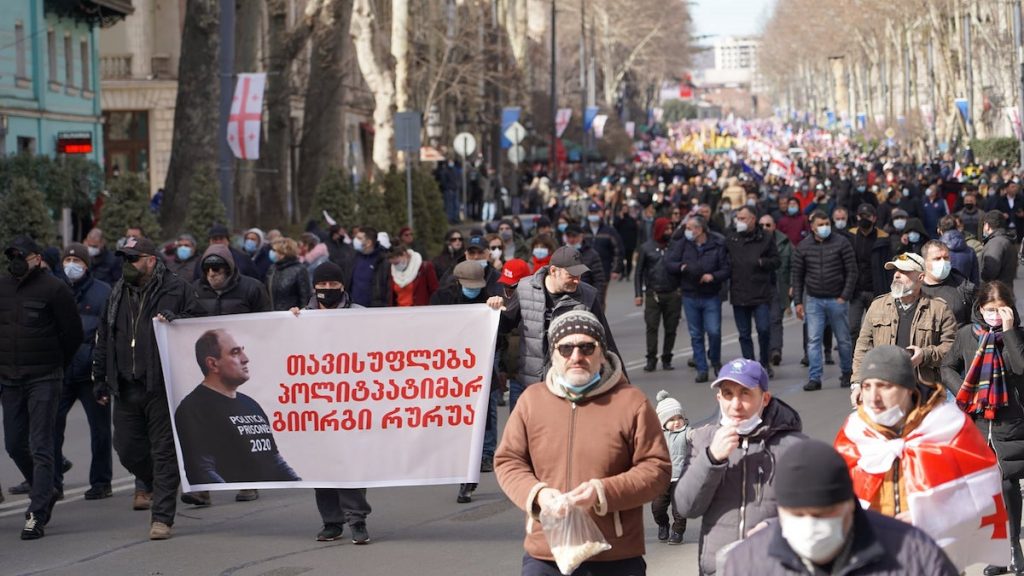
For the first time in the history of Georgia’s independence, these people were openly described as “political prisoners” by some members of the European Parliament and the US Congress.
Due to the fact that Rurua was not released, the opposition accused the government authorities of violating the agreement, but representatives of the Georgian Dream said that there was no such agreement was ever made and that there were no political prisoners in Georgia since “the rule of law” was established in the country – all despite the fact that the US State Department described the conviction of Rurua as being politically motivated, and Western politicians have repeatedly demanded his release.
The insufficiently independent judiciary and law enforcement systems remain one of the main problems of Georgia, which was unambiguously stated by the head of the European Council Jean Michel during his visit to Tbilisi and was also reinstated by the international organizations and Western allies of Georgia. However, despite international pressure, there are still no signs of the ruling party willing to change the status quo in this matter.
The opposition, disappointed in the negotiations, announced the start of new protests on May 15, and before that, it intends to meet the people living in the regions.
On April 14, the US State Department issued a special statement in which it expressed disappointment that the conflicting political parties in Georgia “do not put the country’s interests above their own political interests”. Moreover, Washington placed the main responsibility on the ruling party.
Shortly after this statement, the Speaker of Parliament announced that the Georgian Dream would sign Danielson’s document unilaterally. However, none of the paragraphs of this document actually contribute to the solution of the main problems threatening the democracy in Georgia.










